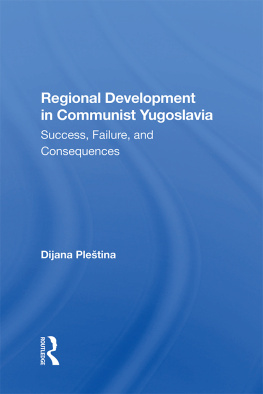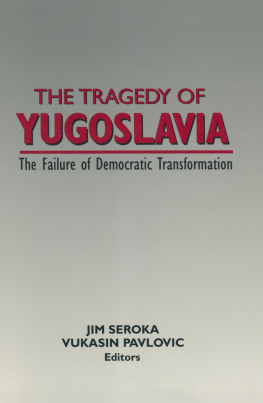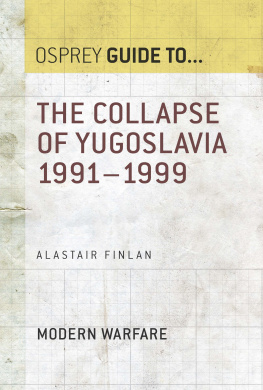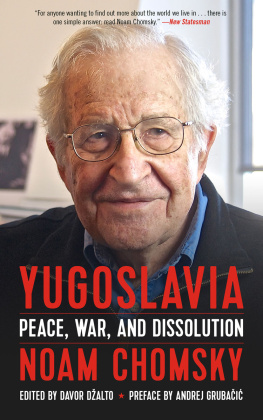Dijana Pleština - Regional Development in Communist Yugoslavia: Success, Failure, and Consequences
Here you can read online Dijana Pleština - Regional Development in Communist Yugoslavia: Success, Failure, and Consequences full text of the book (entire story) in english for free. Download pdf and epub, get meaning, cover and reviews about this ebook. year: 2019, publisher: Routledge, genre: Politics. Description of the work, (preface) as well as reviews are available. Best literature library LitArk.com created for fans of good reading and offers a wide selection of genres:
Romance novel
Science fiction
Adventure
Detective
Science
History
Home and family
Prose
Art
Politics
Computer
Non-fiction
Religion
Business
Children
Humor
Choose a favorite category and find really read worthwhile books. Enjoy immersion in the world of imagination, feel the emotions of the characters or learn something new for yourself, make an fascinating discovery.
- Book:Regional Development in Communist Yugoslavia: Success, Failure, and Consequences
- Author:
- Publisher:Routledge
- Genre:
- Year:2019
- Rating:4 / 5
- Favourites:Add to favourites
- Your mark:
- 80
- 1
- 2
- 3
- 4
- 5
Regional Development in Communist Yugoslavia: Success, Failure, and Consequences: summary, description and annotation
We offer to read an annotation, description, summary or preface (depends on what the author of the book "Regional Development in Communist Yugoslavia: Success, Failure, and Consequences" wrote himself). If you haven't found the necessary information about the book — write in the comments, we will try to find it.
Dijana Pleština: author's other books
Who wrote Regional Development in Communist Yugoslavia: Success, Failure, and Consequences? Find out the surname, the name of the author of the book and a list of all author's works by series.
Regional Development in Communist Yugoslavia: Success, Failure, and Consequences — read online for free the complete book (whole text) full work
Below is the text of the book, divided by pages. System saving the place of the last page read, allows you to conveniently read the book "Regional Development in Communist Yugoslavia: Success, Failure, and Consequences" online for free, without having to search again every time where you left off. Put a bookmark, and you can go to the page where you finished reading at any time.
Font size:
Interval:
Bookmark:

52 Vanderbilt Avenue, New York, NY 10017
2 Park Square, Milton Park, Abingdon, Oxon OX14 4RN
Product or corporate names may be trademarks or registered trademarks, and are used only for identification and explanation without intent to infringe.
Pletina, Dijana.
Regional development in Communist Yugoslavia: success, failure,
and consequences / by Dijana Pletina.
p. cm.
Includes bibliographical references and index.
ISBN 0-8133-8186-X
1. YugoslaviaEconomic conditions1945 Regional disparities.
2. YugoslaviaEconomic policy1945 I. Title.
HC407.P57 1992
330.9497'02dc20 92-32259
CIP
- BiH Bosnia-Hercegovina
- BOAL Basic Organization of Associated Labor
- CPY Communist Party of Yugoslavia
- Development Fund/The Fund Fund for the Accelerated Development of the Insufficiently Developed Republics and the Autonomous Province of Kosovo
- DR Developed Region
- FEC Federal Executive Council
- FNRJ Federalna Narodna Republika Jugoslavije (Federal Peoples' Republic of Yugoslavia)
- GIF General Investment Fund
- GMP Gross Material Product
- LCY League of Communists of Yugoslavia
- LDR Less Developed Region
- SFRY Socialist Federative Republic of Yugoslavia
Font size:
Interval:
Bookmark:
Similar books «Regional Development in Communist Yugoslavia: Success, Failure, and Consequences»
Look at similar books to Regional Development in Communist Yugoslavia: Success, Failure, and Consequences. We have selected literature similar in name and meaning in the hope of providing readers with more options to find new, interesting, not yet read works.
Discussion, reviews of the book Regional Development in Communist Yugoslavia: Success, Failure, and Consequences and just readers' own opinions. Leave your comments, write what you think about the work, its meaning or the main characters. Specify what exactly you liked and what you didn't like, and why you think so.











